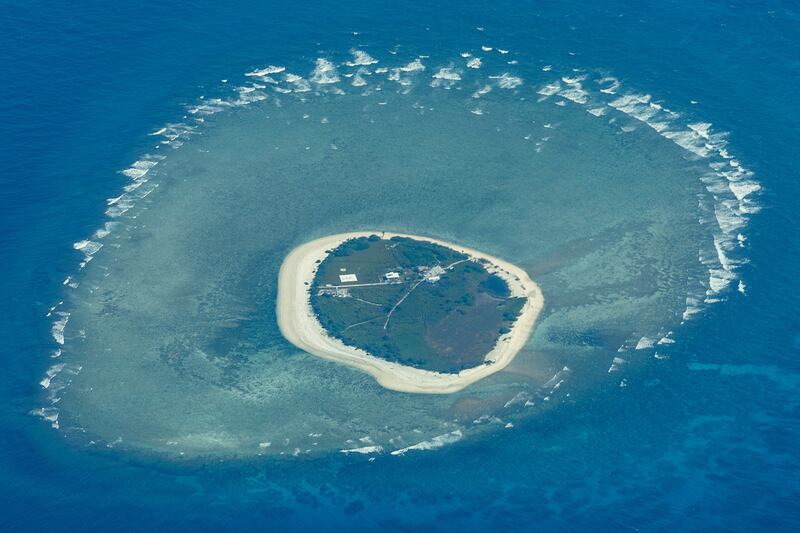China and Southeast Asian nations agreed Thursday to speed up an agreement to prevent conflict in the South China Sea where overlapping claims by Beijing and its neighbors have raised tensions.
The guidelines to accelerate negotiations on a code of conduct for the South China Sea represent a “milestone,” the Indonesian foreign minister said after diplomats from both sides adopted them at a meeting in Jakarta.
No details were released, although the Associated Press news agency cited an unnamed Southeast Asian diplomat as saying that both sides agreed to conclude a pact before autumn 2026.
The Jakarta meeting was attended by all foreign ministers of the Association of Southeast Asian Nations (ASEAN) barring Myanmar, and Wang Yi, who heads the ruling Chinese Communist Party’s foreign affairs commission, the Indonesian Foreign Ministry said.
Indonesia’s top diplomat, Retno Marsudi, who co-chaired the meeting with Wang, said the agreement showed their commitment to maintaining peace and stability in the region.
“These achievements should continue to build a positive momentum to strengthen a partnership that advances the paradigm of inclusivity and openness, respects international law including UNCLOS 1982, and promotes a culture of dialogue and collaboration,” Retno said in a statement, referring to the United Nations Convention on the Law of the Sea.
Retno also welcomed the completion of the second reading of the draft code of conduct this year, after the completion of the first reading in 2019.
China “should be a trusted partner of ASEAN” in nurturing an open and inclusive regional architecture, she said.
“Only in this way can we achieve win-win cooperation for the sake of peace, stability, and shared prosperity in the Indo-Pacific,” Retno added.
Wang, meanwhile, said Beijing supported ASEAN’s central role in the region, according to China’s Xinhua news agency.
China stands ready to continue to play a constructive role in its early conclusion, Xinhua quoted Wang as saying.
China and ASEAN have been negotiating a code of conduct for the South China Sea since 2002, but progress has been slow amid disputes over the scope and legal status of the document.

China claims almost all of the strategic waterway, which is also contested by Taiwan and ASEAN members Brunei, Malaysia, the Philippines and Vietnam. And stability in Southeast Asia has been threatened lately with alleged incursions by Chinese vessels in the exclusive economic zones of the Philippines and Malaysia in the South China Sea.
Indonesia does not have any territorial disputes with China, but it has repeatedly lodged protests against Chinese fishing boats and coast guard vessels entering its EEZ near the Natuna Islands.
In 2016, the Philippines won a landmark international ruling at the Permanent Court of Arbitration, which threw out China’s expansive claims in the South China Sea. Beijing, however, has ignored the verdict and carried on with its military expansionism in the strategic waterway, including building artificial islands.
The South China Sea has also become a theater for big-power rivalry, as the United States, which has vital interests in the region, has accused China of militarizing the area and undermining freedom of navigation.
For its part, Beijing calls Washington’s moves in the region interference and insists it has historical rights to the sea’s resources.
U.S. Secretary of State Antony Blinken is scheduled to meet with his ASEAN counterparts at a conference in Jakarta on Friday.
‘Potential positive impact’
The guidelines agreed to by ASEAN members and China could be in the nature of technical agreements on how the preventive principles in the code can be implemented, said Vinsensio Dugis, the head of the ASEAN Studies Center at Airlangga University in Surabaya.
“If this is the case, this should be welcomed, because it reflects the intention of the parties that claim part or all of the South China Sea territory to reach an agreement on the implementation of the code of conduct,” he told BenarNews.
Additionally, one of the sticking points in the negotiation revolved around the involvement of countries outside China and ASEAN in the implementation of the code of conduct, Vinsensio said.
“China does not want any involvement of other countries, while some ASEAN countries see the need for countries such as the U.S. to also be involved in the process. I think this has been a major obstacle to implementing the principles in the code of conduct,” he said.
Still, the agreement between ASEAN and China brings potential positive impact to Southeast Asia and the Asia-Pacific region.
“This means that there is a possibility of stability in the region, which is very important for peace and development,” he said.
On trade, China has been an important partner for ASEAN in promoting economic growth and fighting the COVID-19 pandemic, Indonesia’s Retno said.
Their bilateral trade reached U.S. $975 billion last year, making China ASEAN’s largest trading partner, while China was also the fourth largest source of foreign investment in ASEAN with $13.8 billion, Retno said.
A day earlier, China’s Wang urged ASEAN to speed up negotiations on an upgraded free trade agreement that would boost economic ties and post-COVID-19 pandemic recovery.
“China and ASEAN should jointly safeguard the global free trading system, uphold the ASEAN centrality, and jointly maintain regional peace and development,” Wang said after talks with Singapore Foreign Minister Vivian Balakrishnan on Wednesday.
China and ASEAN have been operating a free trade area since 2010, which covers trade in goods, services and investment. It is the largest free trade area in terms of population and third largest in terms of nominal GDP.
The two sides launched negotiations on an upgraded version of the free trade agreement in 2016, aiming to further liberalize and facilitate trade and investment.
Wang said both sides should speed up the talks on the so-called FTA 3.0 to “inject new impetus into regional development.”
